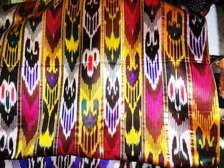 Marghilan is one of the oldest cities of Fergana Valley in Uzbekistan. The city is famous for beautiful fabrics produced here. In Marghilan local people have engaged in manufacturing of silk fabrics since ancient times. Silk was known to be one of the most popular commodities of merchants, who exported it along the Silk Road in Greece and Egypt, Iran and China. At the end of XX century large population of Marghilan were weavers and artisans.
Marghilan is one of the oldest cities of Fergana Valley in Uzbekistan. The city is famous for beautiful fabrics produced here. In Marghilan local people have engaged in manufacturing of silk fabrics since ancient times. Silk was known to be one of the most popular commodities of merchants, who exported it along the Silk Road in Greece and Egypt, Iran and China. At the end of XX century large population of Marghilan were weavers and artisans.
Today Marghilan is one of the main centres of rich traditions of silk weaving with its style, originality and techniques. Silk fabrics are produced here: adras, bekasami, benesary, light and thin silk for women's clothing – shoyi and madali, thick purple cloth-turm, which are original in contrast, and also abr atlases; from Persian “abr” means “cloud” that is light, weightless.
It is not surprisingly, embroidery with colored silk threads was the favorite occupation of local needlewomen. Some products are used as interior decoration, others had utilitarian (practical) importance.
Factory "Yodgorlik" produces fabrics and products made of natural silk handmade (gas, excelsior, shoyi, atlas, adras, etc). For hand-made fabrics masters must perform 40 operations, from manufacturing of yarn and ending with production of finished goods. In order to get the silk thread manually, it is very difficult and time-consuming process, that’s why silk handmade fabrics are prized highly.